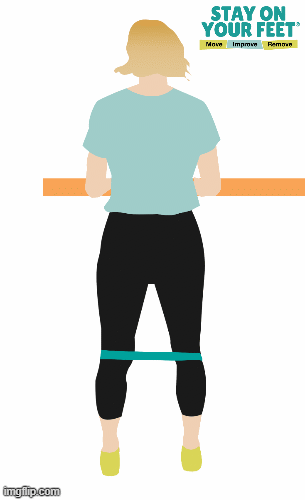Balance is the ability to maintain a stable and controlled body position when moving. Balance plays an important role in daily activities such as walking, bending over to put shoes on, driving a car, or grocery shopping.
Balance requires our body’s system to work together to control our movements.
Balance and vision
Your eyes play an essential role in helping you to keep your balance. Your eyes alert your brain to what is near you and help your body to make changes as you need to. Changes in your eyesight can stop your brain from receiving the correct information, which can affect your balance.
Balance and muscles and joints
Your muscles and joints store information about the position and movement of your body, which helps your body to change position. Strong muscles are also needed to support and correct any changes in your balance.
Poor balance is a common cause of falls in older adults. You may be at risk of a fall if you:
- Feel unsteady on your feet
- Have trouble walking on uneven surfaces
- Use a walking frame or walking stick to steady yourself
Complete the Move Your Body quiz to see if your balance impacts your risk of having a fall.
Balance and ear health
As you get older, you may start to experience hearing loss and changes in your ear health. Some conditions that affect the inner ear can impact your balance and result in vertigo or dizziness, increasing your risk of having a fall. If you notice signs of dizziness, it is best to speak to your doctor or GP. If you see signs of hearing loss, talk to your doctor or GP, or visit an Audiologist at a hearing clinic to get your hearing checked.
How can you build your balance?
Building your balance is one of the best ways to avoid a fall.
Complete balance exercises every other day and make exercises more challenging as your balance improves to reduce your risk of having a fall.
Speak to a health or fitness professional about balance exercises that are right for you.
Activities that involve leaning forwards, backwards, and to the side, such as tai chi, Prime Movers or Strength for Life, can help to build your balance. Recreational activities can also provide a fun way to stay active and connected with your community. To learn about the physical benefits of tennis, swimming, golf, lawn bowls, and dancing, hear from some local participants or view our recreational activity resources.
It is important to participate in balance activities that you enjoy. To find low-cost exercise activities in your local area, search the Injury Matters eDirectory.
To learn about different ways you can build your balance at home:
- Download or order the Stay On Your Feet® Build Your Balance Exercise Flyer.
- Watch the Build Your Balance Exercise Video.
- Complete the online Move Your Body module.
To stay safe while challenging your balance, make sure you have a stable surface nearby in case you need something to hold onto. If you have not challenged your balance in a long time or don’t feel confident doing balance exercises, talk to your doctor or GP, or a Physiotherapist before starting balance exercises.

Who can help you build your balance?
Doctors or GPs
If you have any concerns about your balance, it is best to speak to your doctor or GP at your next appointment. If you don’t have a regular doctor or GP, use Health Direct to find one near you.
Physiotherapists
Physiotherapists can help you if you have problems with your muscles, joints, or movement. Your physiotherapist will work with you to provide activities to improve your balance, flexibility, and strength. If you don’t have a regular physiotherapist, use Health Direct to find one near you.
Exercise Physiologists
Exercise physiologists can provide you with exercises that can help prevent falls, as well as manage other health conditions and injuries. Use Health Direct to find an exercise physiologist near you.
Personal Trainers
Personal trainers can assist you with exercises to suit your needs and abilities. They can help to motivate you, help you to set goals, and assist you in building your strength and balance. Personal trainers can usually be booked at your local gym or recreation centre.
Aboriginal Health Workers
Aboriginal Health Workers can help you to find services that suit your needs. They help to provide a link between Aboriginal communities and health care services. For more information visit the services below:
- Australian Indigenous HealthInfoNet
- Aboriginal Health Council of Western Australia
- WA Department of Health – Aboriginal Health
Audiologists
Audiologists can help you with hearing loss and balance disorders. They can also help to provide support with the use of hearing aids and other assistive aids. Visit Audiology Australia to find an Audiologist near you.
Local falls prevention activities
There are a number of organisations that may be running falls prevention activities in your local area. Search the Injury Matters eDirectory to find activities near you.
Strong legs are also important for moving your body and preventing falls. Learn how you can Strengthen Your Legs to prevent falls.





